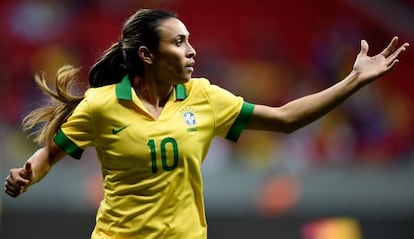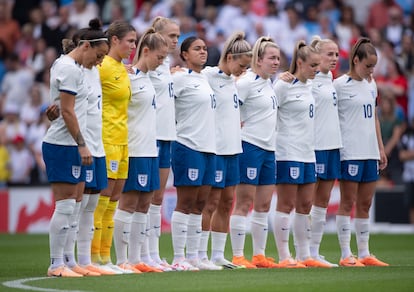FIFA Women’s World Cup: Six contenders for the title in Australia and New Zealand
The United States, France, Germany, Brazil, Sweden and England are among the favorites for glory at the 2023 tournament, although other teams could cause a surprise

Former England striker Gary Lineker left a quote for posterity at the 1990 World Cup in Italy when, after losing to Germany in the semifinals, he said: “Football is a simple game: Twenty-two men chase a ball for 90 minutes and at the end, the Germans always win.” This is not the case in the Women’s World Cup, where the United States has been the most successful nation, but the 2023 tournament in Australia and New Zealand is more open than ever, with as many as six genuine challengers for the title.

The glory of the United States. The USA have won half of the eight World Cups contested to date (1991, 1999, 2015 and 2019), and they have never failed to reach at least the semifinals. Legends of the game including Mia Hamm, Michelle Akers, Abby Wambach, Kristine Lilly, Carli Lloyd and Megan Rapinoe adorn a golden list of players who have maintained their team at the top. As the two-time defending champions, the USA can make history as the first team to win three World Cups in a row. Italy’s men fell short in 1950 and Brazil failed to take their opportunity in 1966; Germany, in the Women’s World Cup, were the two-time winners and hosts in 2011, when Japan claimed the title, beating the USA in the final.
Vlatko Andonovski’s side is in a transitional period, a rejuvenated team that nevertheless contains players of the stature of Alex Morgan — “born for the big moments,” her coach says — Rapinoe, striker Sophia Smith and midfielder Kristie Mewis. “This team is the best we’ve ever had,” said Morgan.
France’s big chance. The arrival of experienced coach Hervé Renard, who has coached the men’s national teams of Zambia, Angola, Côte d’Ivoire, Morocco and Saudi Arabia and won the Africa Cup of Nations twice, has unleashed the hopes of Les Bleues, whose best result in a World Cup was a run to the semifinals in 2011, a result they matched at the 2022 European Championship. Renard has been boosted by the availability of defender Wendie Renard, France’s seventh highest-scorer with 34 goals - in addition to the prolific Eugénie Le Sommer in attack. Other players to keep an eye on are keeper Pauline Peyraud-Magnin, defender Selma Bacha, and young Real Madrid forward Naomie Feller, although the loss of midfielder Amandine Henry to injury is a blow for Les Bleus. “Speed is important in modern soccer. I want a midfield with young players to bring dynamism. We need to show a winning attitude, pressing high up the pitch. In soccer, you have to be effective,” said Renard.

The Marta-Brazil pairing. Brazil have never missed a FIFA World Cup finals but they are a ball-playing powerhouse who have rarely been coherent on the pitch, except perhaps in 2007, when the attacking trident of Marta, Cristiane and Formiga led the team to silver after a 4-0 semifinal win over the United States. But since then, Brazil have been unable to get past the group stage. Marta, now recovered from a ligament injury, is still the focal point: “She is the national team,” said coach Pia Sundhage. Marta will be supported by Debinha, the dribbler and highly decorated technician. It will be up to the two forwards to lead Brazil, the perennial contender but never a champion, in what will almost certainly be Marta’s final World Cup.
Germany’s competitive gene. Germany’s tenacity is unparalleled: champions in 2003 and 2007, runners-up in 1995 and semifinalists in 1991 and 2015, as well as beaten finalists at the 2022 European Championship, they had an almost immaculate qualifying campaign — nine wins and one defeat — and are aiming to reclaim the throne. Coach Martina Voss-Tecklenburg demands a soccer of effort and speed, back-and-forth play with physicality as its banner and the goals of striker Alex Popp, chosen by Kicker magazine as Germany’s personality of the year in 2022, the first time a woman had won the award. Popp scored in every game at the European Championship, except for the final, which she missed through injury.

England on the rise. There is no better women’s league than England’s Super League and the Lionesses arrive at World Cup as reigning European champions. Sarina Wiegman’s team exudes touch, speed and skillful transitions with Keira Walsh in the engine room, who last season became the most-expensive player in the history of women’s soccer when she moved from Manchester City to Barcelona for a fee of around €470,000. On the right flank is Walsh’s club teammate Lucy Bronze, a big game player who lights up matches. England will be without prolific striker Beth Mead but will be confident of going one better than their two semifinal runs in 2015 and 2019.
Sweden, the eternal contender. Sweden have reached the semifinals at the World Cup four times (1991, 2003, 2011 and 2019). They were runners-up at the Tokyo Olympic Games, losing the final against Canada on penalties, and have reached the semifinals in five of the last six major tournaments they have played in. Sweden possesses plenty of goal potential in Stina Blackstenius, Kosovare Asllani and Fridolina Rolfö, who will be aiming to change the fortunes of Peter Gerhardsson’s vastly experienced team.
Other candidates. There are a number of teams that could cause a surprise in Australia and New Zealand. Canada, for example, is looking to shake off its jinx, having finished on the podium at the last three Olympic Games but never at a World Cup. Norway, champions in 1995, finalists in 1991 and semifinalists in 1999 and 2007, will be seeking a return to past glories with players of the stature of Ada Hegerberg and Caroline Graham Hansen in the squad. And then there is the Netherlands, runners-up in the last World Cup and blessed with the talents of Lieke Martens and Daniëlle van de Donk, although the loss of Vivianne Miedema to injury is a significant one.
Sign up for our weekly newsletter to get more English-language news coverage from EL PAÍS USA Edition
Tu suscripción se está usando en otro dispositivo
¿Quieres añadir otro usuario a tu suscripción?
Si continúas leyendo en este dispositivo, no se podrá leer en el otro.
FlechaTu suscripción se está usando en otro dispositivo y solo puedes acceder a EL PAÍS desde un dispositivo a la vez.
Si quieres compartir tu cuenta, cambia tu suscripción a la modalidad Premium, así podrás añadir otro usuario. Cada uno accederá con su propia cuenta de email, lo que os permitirá personalizar vuestra experiencia en EL PAÍS.
¿Tienes una suscripción de empresa? Accede aquí para contratar más cuentas.
En el caso de no saber quién está usando tu cuenta, te recomendamos cambiar tu contraseña aquí.
Si decides continuar compartiendo tu cuenta, este mensaje se mostrará en tu dispositivo y en el de la otra persona que está usando tu cuenta de forma indefinida, afectando a tu experiencia de lectura. Puedes consultar aquí los términos y condiciones de la suscripción digital.








































